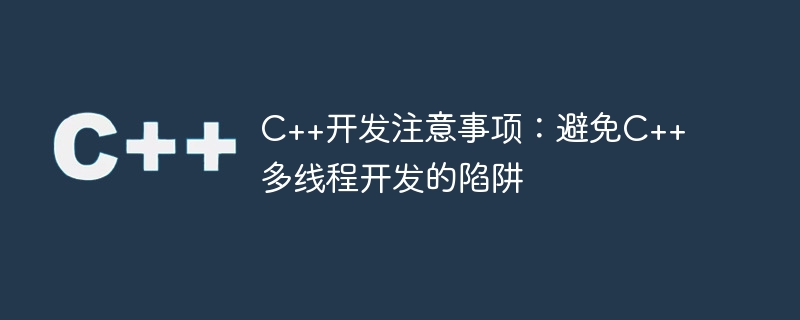

C Development Notes: Avoid the Traps of C Multi-Threaded Development
In today's software development field, multi-threaded programming has become extremely important. Whether to improve program performance or to avoid blocking, using multi-threads for parallel processing has become a common trend. For C developers, multi-threaded programming is a very important topic, because C is a very powerful and flexible language, but it also has some pitfalls that are easy to fall into. In this article, we will discuss some pitfalls to be aware of in C multi-threaded development and how to avoid them.
C is a language that allows direct access to memory, which also means that in a multi-threaded environment, pointers and references may cause race conditions or memory Access violation. In a multi-threaded program, multiple threads may access the same memory area at the same time, which can lead to unpredictable behavior if synchronization is not performed correctly. Therefore, in multi-threaded development, you should try to avoid using raw pointers and raw references, and use smart pointers and thread-safe data structures instead.
Data competition refers to multiple threads accessing shared data at the same time, in which at least one thread is writing data without any synchronization measures. In C, data races can lead to undefined behavior and even serious program errors. To avoid data races, developers should use thread synchronization mechanisms, such as mutex locks, condition variables, etc., to protect access to shared data. In addition, atomic operations can also be used to ensure atomic access to shared data to avoid data races.
In C multi-threaded development, memory management is a very important issue. Due to thread safety considerations in a multi-threaded environment, special attention needs to be paid to the use and release of memory. If memory is manipulated in multiple threads at the same time, problems such as memory leaks and wild pointers may occur. Therefore, in multi-threaded programs, the RAII (Resource Acquisition Is Initialization) principle should be adopted, and smart pointers and automatic resource management classes should be used to manage memory to ensure the correct release of memory and avoid memory leaks.
In a multi-threaded program, communication and coordination may be required between different threads. This requires developers to use appropriate thread communication and synchronization mechanisms to ensure correct cooperation between threads. The C standard library provides rich thread synchronization and communication mechanisms such as mutexes, condition variables, and atomic operations. Developers can choose the appropriate mechanism to meet the needs of the program based on actual needs.
In multi-threaded programs, exception handling is an issue that requires special attention. Because threads execute concurrently, exceptions may produce some unexpected results in a multi-threaded environment. In order to ensure the reliability of the program, developers should be particularly careful in handling exceptions in a multi-threaded environment to avoid uncaught exceptions that may lead to program crashes or unpredictable behavior.
In C multi-threaded development, special attention needs to be paid to the thread safety of the code. Thread safety means that in a multi-threaded environment, the program can run as expected without problems such as data competition, deadlock, memory leaks, etc. In order to ensure the thread safety of the program, developers should pay special attention to shared data access in the code and the correct management of shared resources.
In general, C multi-threaded development is a very complex topic, and developers need to fully understand the basic principles and techniques of multi-threaded programming to avoid some common pitfalls. This article introduces some pitfalls that need to be paid attention to in C multi-threaded development, including the abuse of pointers and references, data competition, memory management, inter-thread communication and synchronization, exception handling, and thread safety. By avoiding these pitfalls, developers can write more robust and reliable multi-threaded programs, thereby better taking advantage of the C language in the field of multi-threaded development.
The above is the detailed content of C++ development considerations: Avoid the pitfalls of C++ multi-threaded development. For more information, please follow other related articles on the PHP Chinese website!




